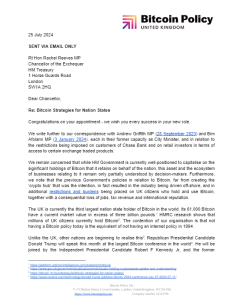Is the UK government sitting on a digital goldmine, and are they about to sell it off at the wrong time? A prominent Bitcoin lobbying group, Bitcoin Policy, is strongly advising the UK government to hold onto its significant Bitcoin reserves, arguing against a potential sale of over 61,000 BTC. Why? They believe selling now would be a misstep, especially considering the shifting global landscape of cryptocurrency adoption and the pro-crypto signals emanating from figures like Donald Trump.
Why is Bitcoin Policy Urging the UK to Hold its Bitcoin?
Bitcoin Policy, a UK-based lobbying group, has taken a proactive stance by sending a formal letter and manifesto to key UK government officials – Chancellor of the Exchequer Rachel Reeves and City Minister Tulip Siddiq. Their message is clear: the UK should embrace a pro-crypto policy and, crucially, refrain from selling its substantial Bitcoin holdings.

The group outlines three key policy changes they deem ‘simple’ yet impactful for the UK. At the heart of their argument is the assertion that the UK government’s Bitcoin stash, estimated at over 61,000 coins (specifically 61,245), should be treated as a strategic national asset, not a disposable commodity.
Here’s a breakdown of their core arguments:
- Protect Citizen and Government Bitcoin Value: Bitcoin Policy emphasizes that with an estimated five million UK citizens owning Bitcoin or other cryptocurrencies, the government has a responsibility to avoid actions that could negatively impact the value of these holdings – both public and private. They firmly believe the government is “duty bound” to “take steps to preserve and enhance the value of the bitcoin that it holds on the nation’s behalf.”
- Bitcoin as a Treasury Reserve Asset: Drawing a direct contrast to Germany’s approach of selling seized Bitcoin, the lobbying group advocates for the UK to hold its Bitcoin as a Treasury reserve asset. This strategic move, they argue, would position Bitcoin as a long-term store of value for the nation.
- Join the Global Bitcoin Conversation: Bitcoin Policy stresses the importance of the UK becoming an active participant in the global Bitcoin landscape. They point to examples of nations and political figures embracing Bitcoin, highlighting the UK’s current absence from this growing movement.
Why Now? The Global Crypto Context
The timing of Bitcoin Policy’s appeal is significant. They highlight the increasing global momentum behind cryptocurrency adoption, pointing to several key factors:
- Donald Trump’s Pro-Bitcoin Stance: The letter specifically mentions Donald Trump’s upcoming appearance at a major Bitcoin conference in July 2024, alongside other prominent figures like Robert F Kennedy Jr. and Vivek Ramaswamy. This, they argue, signals a growing political acceptance of Bitcoin at the highest levels.
- International Adoption: Bitcoin Policy notes that countries like El Salvador, Bhutan, and the UAE are actively engaging with Bitcoin, including state-level mining operations. This international trend underscores the UK’s potential to be left behind if it doesn’t engage with Bitcoin.
- US State-Level Protections: The group points to legislative developments in the United States, where state legislatures are enacting laws to protect individual rights related to Bitcoin self-custody and mining.
Bitcoin: More Than Just Digital Currency?
Bitcoin Policy goes beyond simply advocating for holding Bitcoin as a financial asset. They also present compelling arguments for Bitcoin’s broader strategic importance to the UK:
- Economic Resilience: The lobbying group posits that Bitcoin could provide the UK with an alternative transaction channel, particularly in scenarios where traditional financial systems are disrupted. They state Bitcoin “Would enable the United Kingdom to continue to transact with its trading partners even in the event that all other channels of transaction were closed.” While they don’t specify the exact nature of such an event, the implication is clear: Bitcoin offers a decentralized and resilient financial network.
- Sustainable Energy Partner: Bitcoin Policy argues that Bitcoin mining can be a valuable partner for sustainable energy grids. They suggest that Bitcoin mining operations can utilize surplus energy generated by renewable sources like wind turbines, creating a symbiotic relationship that benefits both the energy sector and the Bitcoin network.
Who is Bitcoin Policy?
Bitcoin Policy describes itself as a non-profit, non-partisan, and independent organization dedicated to “Spearheading a movement to integrate Bitcoin into the UK’s economy.” Led by Susie Violet Ward (Bitcoin journalist), Freddie New (co-founder of a crypto research platform), and CEO Bill Aronson (executive at an AI research group), the organization brings together expertise from various fields to advocate for informed Bitcoin policy in the UK.
The Bottom Line: Should the UK Hold or Fold on Bitcoin?
Bitcoin Policy’s message is a clear call to action for the UK government: recognize the strategic importance of Bitcoin, not just as a cryptocurrency, but as a potential reserve asset, a tool for economic resilience, and a partner for sustainable energy. As the global landscape of digital finance evolves rapidly, the UK’s decision on its Bitcoin holdings could have significant implications for its future economic and technological standing. Will the UK heed the warnings and join the global Bitcoin conversation, or will it risk being left behind?
Disclaimer: The information provided is not trading advice, Bitcoinworld.co.in holds no liability for any investments made based on the information provided on this page. We strongly recommend independent research and/or consultation with a qualified professional before making any investment decisions.


